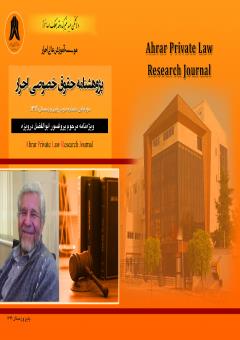امکان سنجی بازفروشی در حقوق ایران در مقایسه با کنوانسیون بیع بینالمللی کالا
محورهای موضوعی : حقوق مدنی
1 - پزشک عمومی، عضو هیأت علمی حقوق خصوصی، گروه حقوق، مؤسسه فناوری و آموزش عالی احرار، رشت، ایران.
کلید واژه: بازفروشی, انحلال, ضمان معاوضی, خیارتاخیر ثمن,
چکیده مقاله :
بعداز عقد بیع اگر مبیع نزد بایع باقی بماند نه تنها بایع باید از مبیع حفاظت نماید بلکه ضمان معاوضی برعهده او بوده درحالیکه مبیع و منافع و نمائات آن متعلق به مشتری است.. علاوه براین هزینههای نگه داری مبیع از زمان انعقاد عقد تا زمان تحویل و یا تلف بر عهده شخص بایع خواهد بود و این امر موجب عدم تعادل رابطه قراردادی بین بایع و مشتری میگردد. در پاسخ به این سوال چه راهکاری برای جلوگیری از ورود خسارات درکنوانسیون بیع بینالمللی کالا و در حقوق ایران وجود دارد؟ باید گفت یکی از راهکارهای غیر قضایی و متعارف برای ایجاد این امنیت اقتصادی و برای جلو گیری از هر گونه خسارت احتمالی سیستم بازفروشی است که دربرخی از مقررات بینالمللی از جمله کنوانسیون بیع بینالمللی کالا ذکر شده است. براساس مقررات کنوانسیون امکان بازفروشی بدون انحلال وجود داشته ودر مقررات ما چنین امری به صورت شفاف ذکر نشده بلکه برعکس برای بازفروشی ابتدا عقد باید منحل گردد سپس بازفروشی ویا امکان انتقال آن خواهدبود با این حال میتوان گفت همزمان با فروش مبیع به دیگری انحلال نیز محقق است.
After the contract of sale, if the seller remains with the seller not only should the seller protect the seller, but he is also responsible for the exchange guarantee, while the seller and its benefits and representations belong to the customer. In addition, the costs of maintaining the seller from the time of concluding the contract until the time of delivery or loss will be borne by the seller and this will cause an imbalance in the contractual relationship between the seller and the customer.In response to this question, what is the solution to prevent damages in the Convention on the International Sale of Goods and in Iranian law?It should be said that one of the non-judicial and conventional solutions to create this economic security and to prevent any possible damage to the resale system is mentioned in some international regulations, including the Convention on the International Sale of Goods.According to the provisions of the convention, it is possible to resell without dissolution, and in our regulations, such a thing is not clearly stated, but on the contrary, for resale, the contract must be dissolved first, then resale or it will be possible to transfer it.
Asghari, Fakhreddin, Zarei, Reza (2010), the right to resell goods (comparative study), Journal of
Business Research, No. 57.
Hosseini Ameli, Seyyed Javad, (1998) Miftah al-Karamah, Volume II, Islamic Publishing House
of the Modaresin Society, Qom.
Khoei, Saydabul al-Qasim (1993), Misbah al-Faqaha, volume seven, Dar al-Hadi, Beirut.
Safai, Seyed Hossein (2014), Comparative Civil Rights, Mizan Publishing House, Tehran.
Safai, Seyed Hossein (2013), Kazemi, Mohammad, Adeli, Mahmoud, International Sales Laws,
Tehran University Publications.
Katouzian, Nasser (2008), Obligations outside the contract, Compulsory guarantee, second volume,
Tehran University Press, Tehran.
Katouzian, Nasser, (1989) General Rules of Contracts, Volume III, Sohami Publishing House,
Tehran.
Karki, Aamili (1993), Jame Al-Maqasad, Nashral Al-Bayt A, Qom.
Mohseni, Hassan (2011), Resale of goods in the Convention on the International Sale of Goods,
Tarbiat Modares Comparative Law Research Journal, Volume 15, Number 1, Tehran.
Mohagheq Damad, Seyyed Mustafa, (2014) Jurisprudence Rules, Islamic Publishing House,
Tehran.
Naraghi, Molly Ahmad (1996), Awaedalayam, Islamic Propaganda Organization Publications,
Qom.
Honnold, John O. (1999), Uniform Law for International Sales under the 1980 United Nations
Convention, U.S., Third edition.
Schlechtriem, Peter (1998), Commentary on the UN Convention on 1931-17 the International Sale
of Goods, New York: Oxford University Press, First edition.
United nations commission on international trade law uncitral.
secretariat,(2020), Vienna International Centre, P.O. Box 500,, Austria, Internet:
www.uncitral.org.


